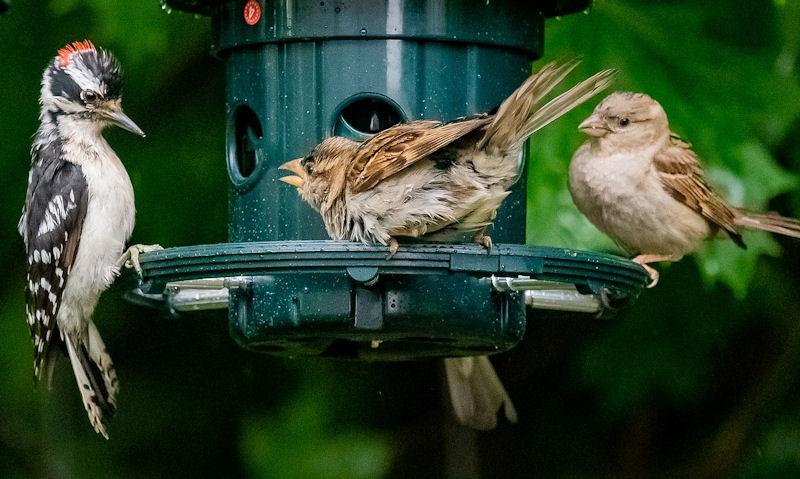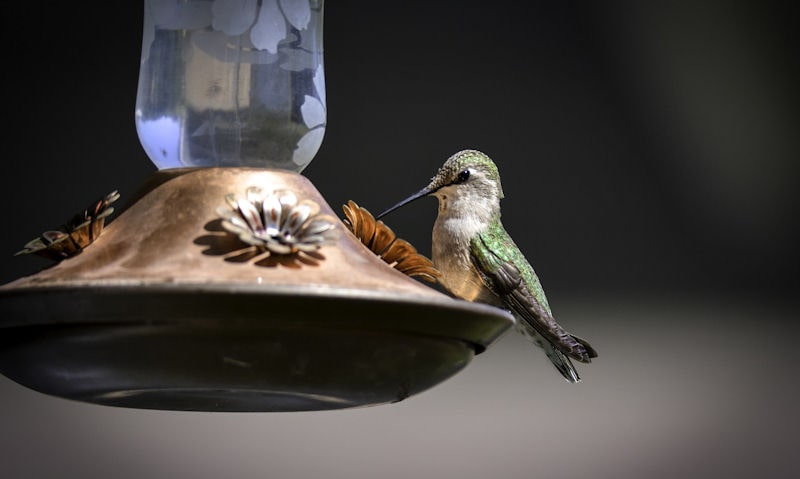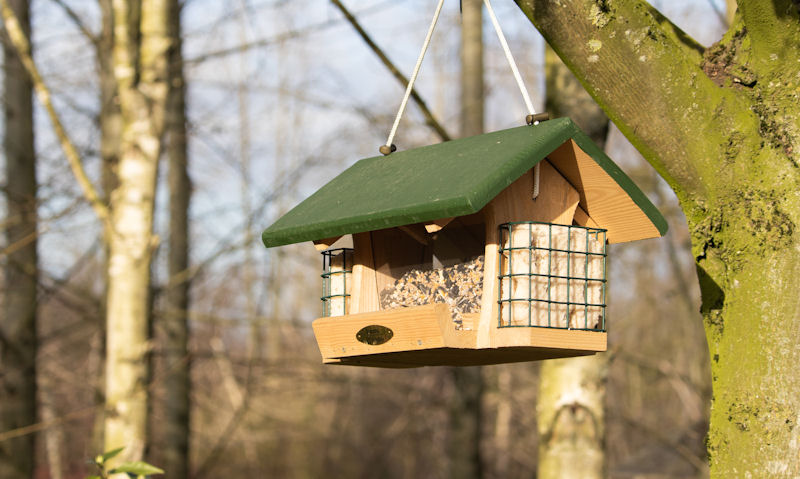Can bird feeders be left in the rain
It can be concerning when setting up a brand new bird feeder out in the rain, but remember birds need to feed come rain or shine, so never bring a bird feeder indoors.
Bird feeders can be left in the rain because they are made to be waterproof. Feeders get wet while the bird feed remains dry. Bird feed can get wet as rain enters the feeder, or due to humidity - as bird feeders can take these conditions. Rain speeds up any signs of rust or fading, so to can just being outdoors.
What you should never do is bring bird feeders in when it rains, wild birds must continue to have access to their favorite feed as its a matter of life and death.
Convenient as it is to take bird feeders indoors when it rains, in the meantime birds are waiting in the yard ready for their next meal as they go hungry.
Bird feeders can get wet and are designed to, thus continue to feed birds in the rain as you always have with no concern of the bird feeders getting damaged.
I will say depending on the type of bird feeder in use it can show signs of wear and tear.
Steel bird feeders can rust a little, while plastic tube feeders can fade due to being exposed to the elements. Nothing of which can stop this happening - as it due to rain, sun and simply caused by feeders being left outdoor.
Rain is a drop in an ocean with what can cause a bird feeder to damage, so rest assured, bird feeders can be left in the rain, including when it snows.
Feeders can be left in rain
Not only can bird feeders be left out in the rain, the whole point of a bird feeder is to keep the bird food contained within them dry as possible to prevent it rotting if exposed.
Feeders can and will be used by birds in wet weather, thus the bird feeders are guaranteed to be used in any weather conditions.
Rain can't really cause damage to bird feeders themselves, but damp can spoil bird food. In fact wet weather can rapidly speed up the germination process in certain bird feed over others - with a bird feeder used to prevent this.
Combine wet weather with humidity, sun and even cold conditions, bird food won't last a long time.
For sure wild bird food can quickly rot in a bird feeder, make no mistake about that; though, feeders will slow this process down to give you a few more days of use even in a drought or frosty weather.
Bird feeders can be left out in the wet weather as birds continue to feed in rain, as they do to survive.
Rust or corrosion unlikely
Depending on the type of bird feeder you are using, it can be possible wet weather can cause damage to bird feeders.
Actually I would say you can see signs of damage early on without rain or dampness setting in.
Bird feeders are made to be outdoors, but like most things in life you can't have nice things for ever. Bird feeders are guaranteed to show signs of wear and tear within the first year of use.
Feeders made in metal will show signs of rust sitting on the surface, whereas a steel metal mesh bird feeder will see rust on the wire.
Rust isn't really going to bleed onto the bird feed in the feeder, though you must be careful in case there's ever a chance it will.
Plastic bird feeders won't rust but they will fade if exposed to outdoor elements for months on end. People often don't mind this but its possible others will simply replace old, past their best bird feeders with a set of new bird feeders.
Bird feeders are weatherproof
Believe it or not, whether bird feeders are made in metal, plastic or wood, they are made to be weatherproof.
Weatherproofing focuses more on keeping the bird food dry inside bird feeders, thus the rain is suppose to be kept out. Saying that, wire or cage bird feeders will allow rain to enter as its exposed - though suet or peanuts can get wet for an extended period of time.
Metal bird feeders will be made in stainless steel or copper for decorative purposes, of which both can be outdoors without showing signs of corrosion.
Similarly, bird feeders made in plastic use a hard wearing, durable plastic designed to be used outdoors.
And then there's bird feeders made in wood, of which the cedar will begin to weather in due course, with an option to treat it in preserve or re-paint it - this is not an option a plastic or metal bird feeder can provide.
Bird feeders are weatherproof and therefore designed to by outdoors 24/7, 365 days of the year - and as the old saying goes... come rain or shine.
Summing it up
Seriously, if bird feeders weren't allowed to get wet as they hang outdoors, most of use will be busy bringing bird feeders indoors every time it rains.
Well, bird feeders are not suppose to be brought indoors for hygiene reasons, thus bird feeders must remain out in the yard in rain, as birds will continue to feed whether its raining or not.
Bird feeders are often made in plastic coated weatherproof metal, in a durable plastic, metal or wood only.
And while metal wire bird feeders or clear plastic tube feeders can show signs of aging, they can be replaced if it gets too bad. Having said that, any corrosion is OK to continue to use the feeder - whilst rust must not be allowed to touch the bird feed.
Bird feed sealed in any type of bird feeder is suppose to not get wet, though it can with no issues for a few days, just as the germination process kicks in. Feeders need to keep bird food dry and this is what they will do.
Birds need to continue to feed in any weather conditions throughout the year, so a bit of rain isn't going to be of any concern.


